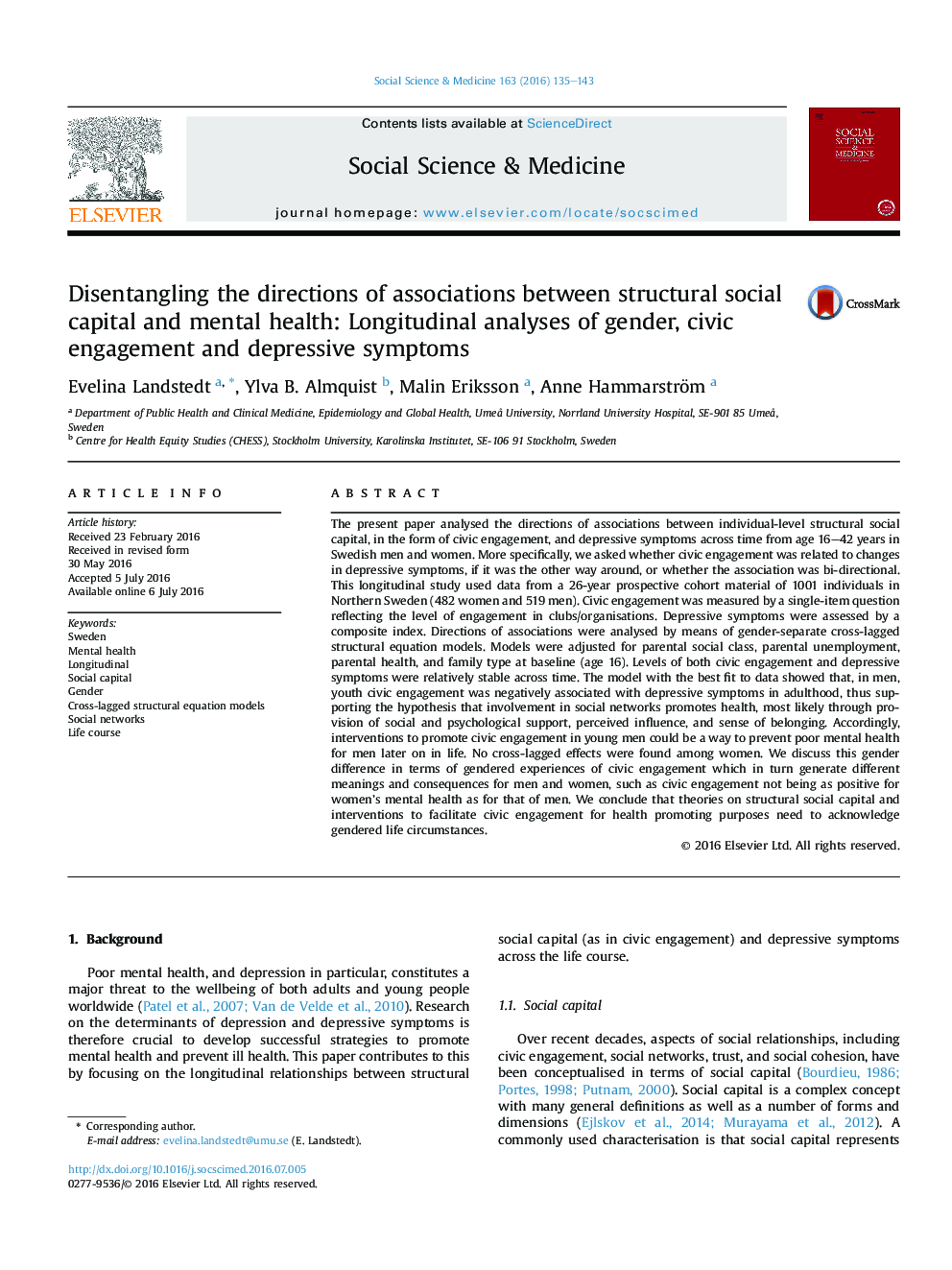| کد مقاله | کد نشریه | سال انتشار | مقاله انگلیسی | نسخه تمام متن |
|---|---|---|---|---|
| 7329666 | 1476006 | 2016 | 9 صفحه PDF | دانلود رایگان |
عنوان انگلیسی مقاله ISI
Disentangling the directions of associations between structural social capital and mental health: Longitudinal analyses of gender, civic engagement and depressive symptoms
ترجمه فارسی عنوان
پیدایش ارتباطات بین سرمایه اجتماعی ساختاری و سلامت روان: تجزیه و تحلیل طولی جنس، تعامل مدنی و نشانه های افسردگی
دانلود مقاله + سفارش ترجمه
دانلود مقاله ISI انگلیسی
رایگان برای ایرانیان
کلمات کلیدی
سوئد، سلامت روان، طولی سرمایه اجتماعی، جنسیت، مدل معادلات ساختاری متقاطع عقب مانده، شبکه های اجتماعی، دوره زندگی،
ترجمه چکیده
در این مقاله، جهت ارتباطات سرمایه اجتماعی ساختاری در سطح فردی، در قالب مشارکت مدنی و علائم افسردگی در سنین 16-42 ساله در مردان و زنان سوئد مورد تجزیه و تحلیل قرار گرفته است. به طور خاص، ما پرسیدیم که آیا مشارکت مدنی به تغییر در علائم افسردگی مربوط می شود، در صورتی که از راه دور بود یا ارتباط دو طرفه بود. این مطالعه طولی با استفاده از داده ها از یک ماده 26 ساله کوهورت آینده 1001 فرد در شمال سوئد (482 زن و 519 مرد). مشارکت مدنی با یک سوال تک تک مورد بررسی قرار گرفت که بازتاب سطح تعامل در باشگاه ها / سازمان ها بود. علائم افسردگی با استفاده از یک شاخص کامپوزیتی مورد ارزیابی قرار گرفتند. جهت ارتباطات، با استفاده از مدل های معادلات ساختاری متقابل از جنس جدا شده جنسیتی تحلیل شد. مدل ها برای طبقه اجتماعی والدین، بیکاری والدین، سلامت والدین و نوع خانواده در ابتدای (16 سالگی) تنظیم شده است. سطوح هنجارهای اجتماعی و علائم افسردگی در طول زمان نسبتا پایدار بود. مدل با بهترین تناسب با داده ها نشان داد که در مردان، مشارکت مدنی جوانان با علائم افسردگی در بزرگسالان منفی همراه بود، بنابراین حمایت از فرضیه این است که مشارکت در شبکه های اجتماعی باعث افزایش سلامتی می شود، به احتمال زیاد از طریق حمایت اجتماعی و روحی، نفوذ درک شده و احساس تعلق. بر این اساس، مداخلات برای ترویج مشارکت مدنی در مردان جوان می تواند راهی برای جلوگیری از سلامت ضعیف روانی مردان باشد. هیچ اثری متناوب در میان زنان وجود نداشت. ما در مورد این تفاوت جنسیتی از لحاظ تجارب جنسیتی از مشارکت مدنی بحث می کنیم که به نوبه خود معانی و عواقب مختلفی را برای مردان و زنان ایجاد می کند، از قبیل دخالت مدنی که برای سلامت روان زنان به عنوان مثبت برای مردان مناسب نیست. ما نتیجه گرفتیم که نظریه های سرمایه اجتماعی ساختاری و مداخلات برای تسهیل مداخلات مدنی برای اهداف ترویج سلامت باید شرایط زندگی جنسی را تشخیص دهند.
موضوعات مرتبط
علوم پزشکی و سلامت
پزشکی و دندانپزشکی
سیاست های بهداشت و سلامت عمومی
چکیده انگلیسی
The present paper analysed the directions of associations between individual-level structural social capital, in the form of civic engagement, and depressive symptoms across time from age 16-42 years in Swedish men and women. More specifically, we asked whether civic engagement was related to changes in depressive symptoms, if it was the other way around, or whether the association was bi-directional. This longitudinal study used data from a 26-year prospective cohort material of 1001 individuals in Northern Sweden (482 women and 519 men). Civic engagement was measured by a single-item question reflecting the level of engagement in clubs/organisations. Depressive symptoms were assessed by a composite index. Directions of associations were analysed by means of gender-separate cross-lagged structural equation models. Models were adjusted for parental social class, parental unemployment, parental health, and family type at baseline (age 16). Levels of both civic engagement and depressive symptoms were relatively stable across time. The model with the best fit to data showed that, in men, youth civic engagement was negatively associated with depressive symptoms in adulthood, thus supporting the hypothesis that involvement in social networks promotes health, most likely through provision of social and psychological support, perceived influence, and sense of belonging. Accordingly, interventions to promote civic engagement in young men could be a way to prevent poor mental health for men later on in life. No cross-lagged effects were found among women. We discuss this gender difference in terms of gendered experiences of civic engagement which in turn generate different meanings and consequences for men and women, such as civic engagement not being as positive for women's mental health as for that of men. We conclude that theories on structural social capital and interventions to facilitate civic engagement for health promoting purposes need to acknowledge gendered life circumstances.
ناشر
Database: Elsevier - ScienceDirect (ساینس دایرکت)
Journal: Social Science & Medicine - Volume 163, August 2016, Pages 135-143
Journal: Social Science & Medicine - Volume 163, August 2016, Pages 135-143
نویسندگان
Evelina Landstedt, Ylva B. Almquist, Malin Eriksson, Anne Hammarström,
